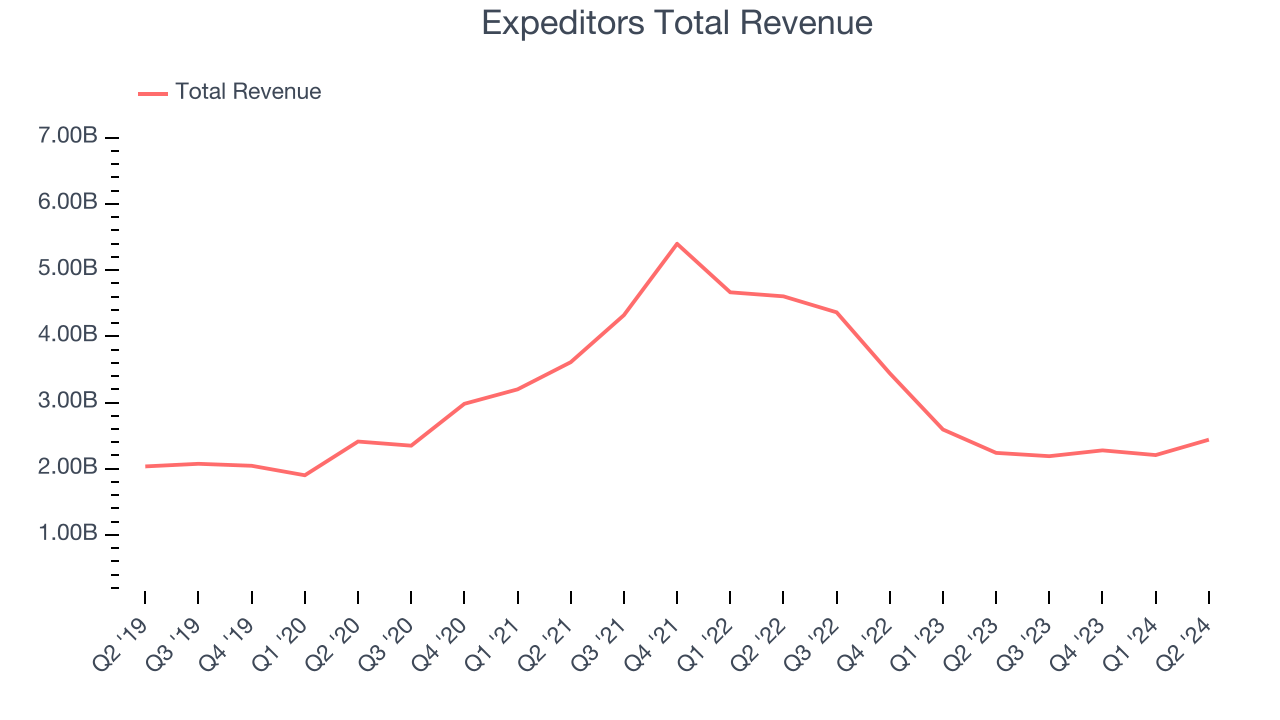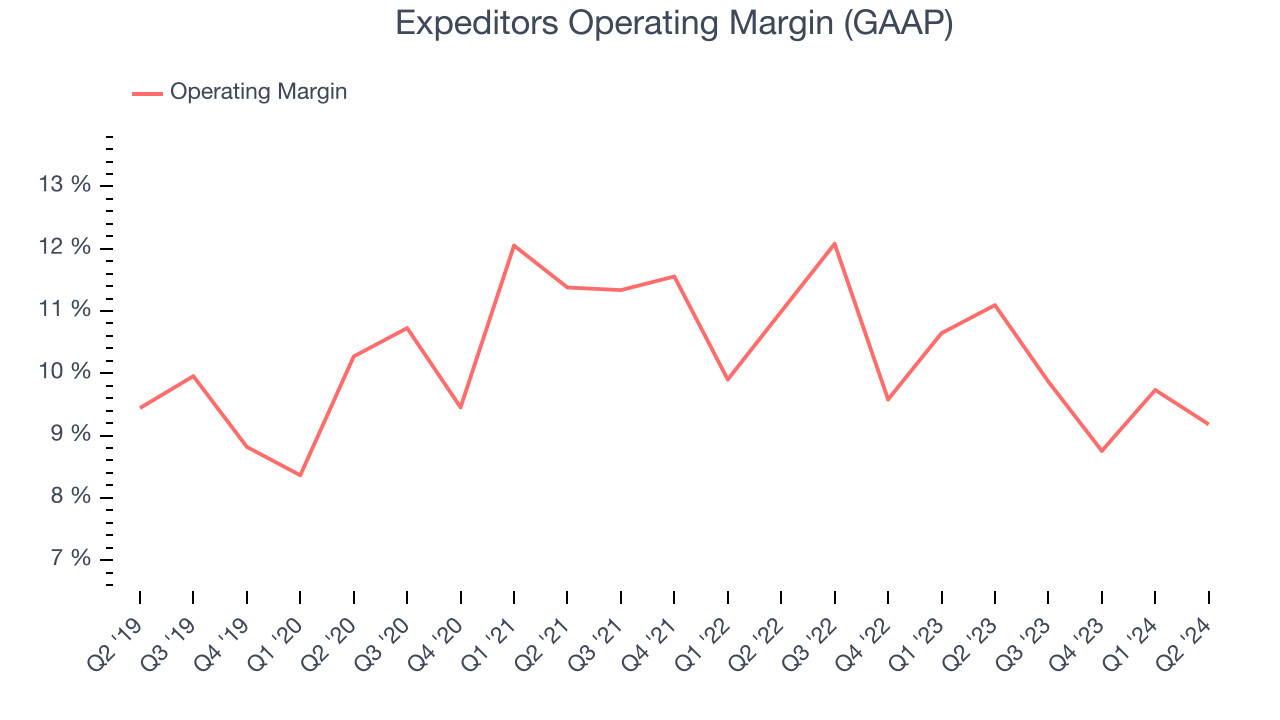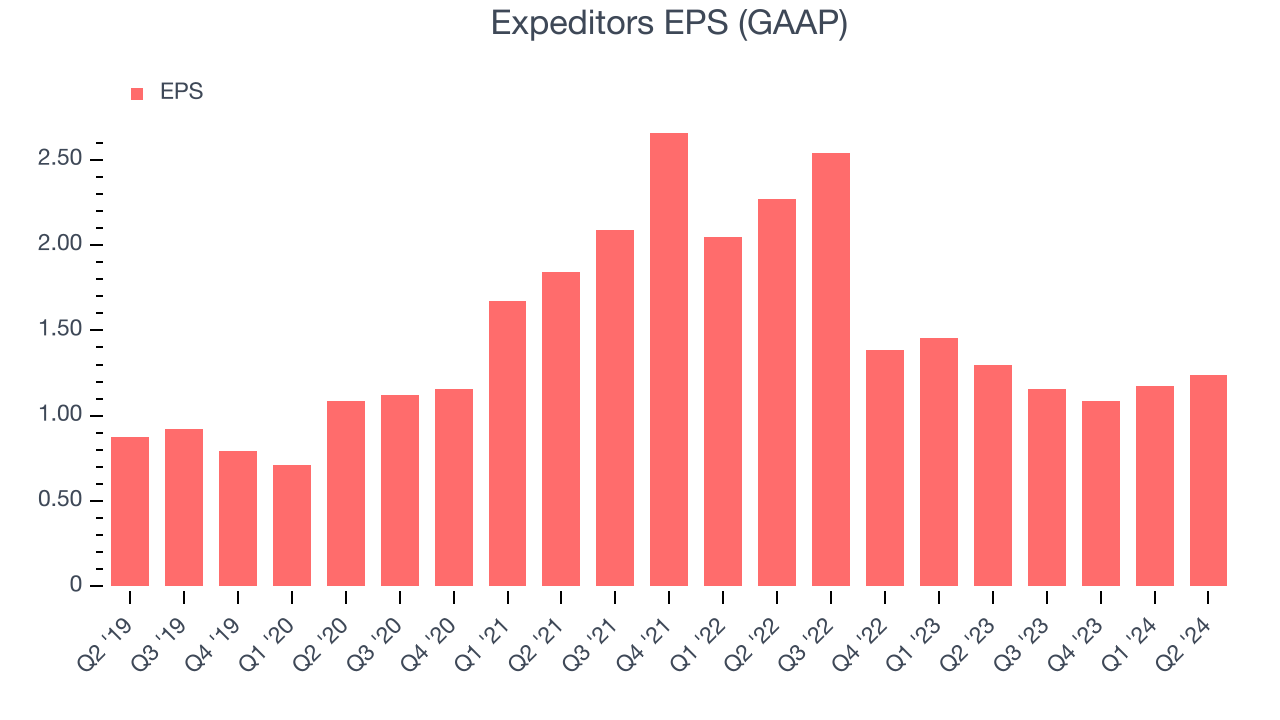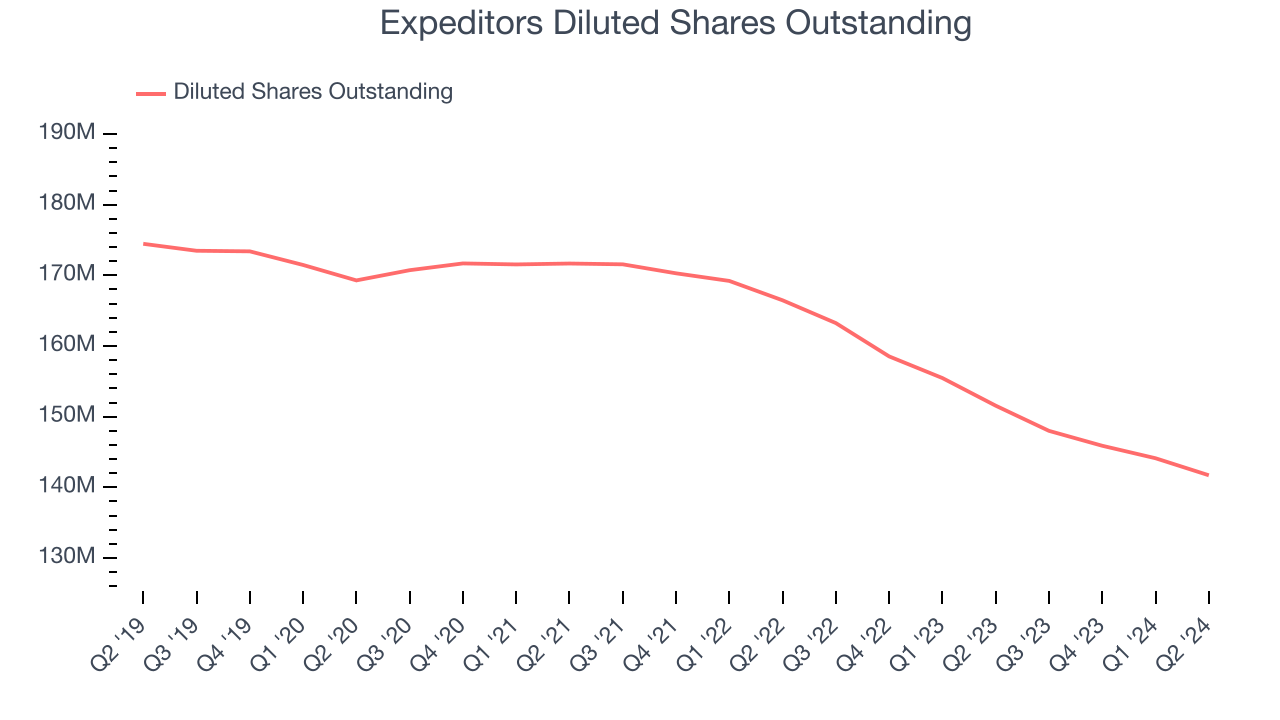Logistics and freight forwarding company Expeditors (NYSE:EXPD) reported Q2 CY2024 results exceeding Wall Street analysts' expectations, with revenue up 8.9% year on year to $2.44 billion. It made a GAAP profit of $1.24 per share, down from its profit of $1.30 per share in the same quarter last year.
Is now the time to buy Expeditors? Find out by accessing our full research report, it's free.
Expeditors (EXPD) Q2 CY2024 Highlights:
- Revenue: $2.44 billion vs analyst estimates of $2.28 billion (6.8% beat)
- EPS: $1.24 vs analyst expectations of $1.26 (1.4% miss)
- Gross Margin (GAAP): 15.3%, up from 14.9% in the same quarter last year
- Adjusted EBITDA Margin: 9.8%, down from 11.8% in the same quarter last year
- Free Cash Flow of $118.8 million, down 51.8% from the previous quarter
- Market Capitalization: $17.13 billion
"We continued to adapt well to another erratic quarter for our industry, which has been impacted by the rapid changes and imbalances in buy versus sell rates, particularly on exports out of Asia,” said Jeffrey S. Musser, President and Chief Executive Officer.
Expeditors (NYSE:EXPD) offers air and ocean freight as well as brokerage services.
Air Freight and Logistics
The growth of e-commerce and global trade continues to drive demand for expedited shipping services, presenting opportunities for air freight companies. The industry continues to invest in advanced technologies such as automated sorting systems and real-time tracking solutions to enhance operational efficiency. Despite the advantages of speed and global reach, air freight and logistics companies are still at the whim of economic cycles. Consumer spending, for example, can greatly impact the demand for these companies’ offerings while fuel costs can influence profit margins.
Sales Growth
A company’s long-term performance can give signals about its business quality. Even a bad business can shine for one or two quarters, but a top-tier one tends to grow for years. Over the last five years, Expeditors grew its sales at a weak 1.7% compounded annual growth rate. This shows it failed to expand in any major way and is a rough starting point for our analysis. 
Long-term growth is the most important, but within industrials, a half-decade historical view may miss new industry trends or demand cycles. Expeditors's history shows it grew in the past but relinquished its gains over the last two years, as its revenue fell by 30.7% annually.
Expeditors also breaks out the revenue for its most important segments, Airfreight and Ocean freight, which are 35.3% and 26.7% of revenue. Over the last two years, Expeditors's Airfreight revenue (transport by plane) averaged 29.2% year-on-year declines while its Ocean freight revenue (transport by sea) averaged 37% declines.
This quarter, Expeditors reported solid year-on-year revenue growth of 8.9%, and its $2.44 billion of revenue outperformed Wall Street's estimates by 6.8%. Looking ahead, Wall Street expects sales to grow 2.1% over the next 12 months, a deceleration from this quarter.
Today’s young investors won’t have read the timeless lessons in Gorilla Game: Picking Winners In High Technology because it was written more than 20 years ago when Microsoft and Apple were first establishing their supremacy. But if we apply the same principles, then enterprise software stocks leveraging their own generative AI capabilities may well be the Gorillas of the future. So, in that spirit, we are excited to present our Special Free Report on a profitable, fast-growing enterprise software stock that is already riding the automation wave and looking to catch the generative AI next.
Operating Margin
Operating margin is one of the best measures of profitability because it tells us how much money a company takes home after procuring and manufacturing its products, marketing and selling them, and, most importantly, keeping them relevant through research and development.
Expeditors has managed its expenses well over the last five years. It demonstrated solid profitability for an industrials business, producing an average operating margin of 10.5%. This result was particularly impressive because of its low gross margin, which is mostly a factor of what it sells and takes huge shifts to move meaningfully. Companies have more control over their operating margins, and it's a show of well-managed operations if they're high when gross margins are low.
Analyzing the trend in its profitability, Expeditors's annual operating margin might have seen some fluctuations but has generally stayed the same over the last five years, highlighting the long-term consistency of its business.

This quarter, Expeditors generated an operating profit margin of 9.2%, down 1.9 percentage points year on year. Since Expeditors's operating margin decreased more than its gross margin, we can assume the company was recently less efficient because expenses such as sales, marketing, R&D, and administrative overhead increased.
EPS
Analyzing long-term revenue trends tells us about a company's historical growth, but the long-term change in its earnings per share (EPS) points to the profitability of that growth–for example, a company could inflate its sales through excessive spending on advertising and promotions.
Expeditors's EPS grew at an unimpressive 5.2% compounded annual growth rate over the last five years. This performance was better than its 1.7% annualized revenue growth but doesn't tell us much about its day-to-day operations because its operating margin didn't expand.

Diving into the nuances of Expeditors's earnings can give us a better understanding of its performance. A five-year view shows that Expeditors has repurchased its stock, shrinking its share count by 18.8%. This tells us its EPS outperformed its revenue not because of increased operational efficiency but financial engineering, as buybacks boost per share earnings. 
Like with revenue, we also analyze EPS over a shorter period to see if we are missing a change in the business. For Expeditors, its two-year annual EPS declines of 28.3% show its recent history was to blame for its underperformance over the last five years. These results were bad no matter how you slice the data.
In Q2, Expeditors reported EPS at $1.24, down from $1.30 in the same quarter last year. This print slightly missed analysts' estimates. Over the next 12 months, Wall Street expects Expeditors to grow its earnings. Analysts are projecting its EPS of $4.66 in the last year to climb by 8.5% to $5.05.
Key Takeaways from Expeditors's Q2 Results
We were impressed by how significantly Expeditors blew past analysts' revenue expectations this quarter. We were also glad its Airfreight revenue topped Wall Street's estimates. On the other hand, its EPS missed, and the market seems to be focusing on this. Lastly, management was cautious about the macro, saying that the "industry remains volatile due to global conflicts, stubborn inflation, fragile economies, and uncertain demand." Zooming out, we think this was a mixed quarter. The stock traded down 3.3% to $117.46 immediately following the results.
So should you invest in Expeditors right now? When making that decision, it's important to consider its valuation, business qualities, as well as what has happened in the latest quarter. We cover that in our actionable full research report which you can read here, it's free.
